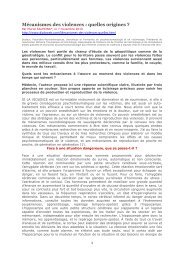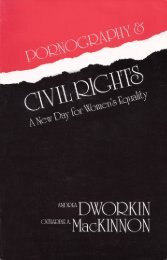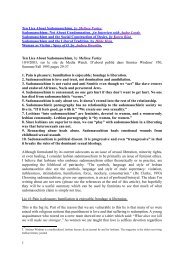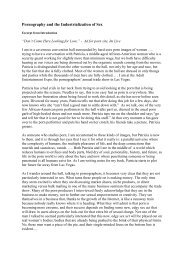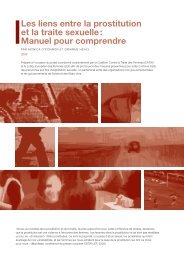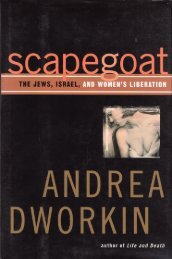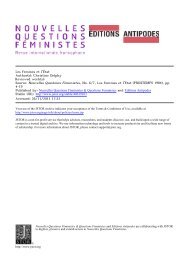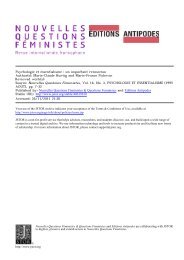2 NOTHING MAT(T)ERSthe post-1945, postmodern ideology: “appearances are everything, it is forbidden togo beyond them…the world <strong>of</strong> enterprises, struggles, need, work, the whole realworld, disappears into thin air” (1968, p. 636). She charges that “with the intention<strong>of</strong> saying nothing, they mask the absence <strong>of</strong> content with formal convolutions…”(1968, p. 636). De Beauvoir links this “escape into fantasies about the absolute” and“defeatism” (1968, p. 637) to the degraded situation <strong>of</strong> France and the rise <strong>of</strong> fascismthere.Those who have stood at the door <strong>of</strong> the Mast<strong>ers</strong>’ House <strong>of</strong> science and subjectivity,<strong>of</strong> class and state power, have been struck by what O’Brien calls “an ironic sense inwhich the und<strong>ers</strong>tanding <strong>of</strong> how hegemony works might well be clarified in anethnography <strong>of</strong> Marxist intellectuals” (1989, p. 233). Maria-Antonietta Macciocchi,a former student <strong>of</strong> Louis Althusser, looks back at the men <strong>of</strong> her generation andrecalls life among the men <strong>of</strong> science and subjectivity, class and state power. Shechronicles their disappearance as the ending <strong>of</strong> an era:Nikos Poulantzas committed suicide on October 3, 1979. Lacan dissolved hisschool on March 16, 1980. Sartre died on April 15, 1980. Barthes, victim <strong>of</strong> anautomobile accident on February 18, 1980, died in the month <strong>of</strong> April in thesame year. Althusser strangled his wife on November 17, 1980. Lacan died onSeptember 19, 1981 (1983, p. 487).Certainly, their works influenced, engaged and denounced one another in manyways. Althusser reread Marx and Lacan, Lacan reinterpreted Freud, Barthes’Mythologies was indebted to Lévi-Strauss’s Mythologiques, Sartre influencedFoucault, and Poulantzas tried to write the methodological micro-histories called forby Althusser. Foucault said: “Open Althusser’s books” (Bellour: 1971, p. 192) eventhough he disagreed that Marx represented an epistemological break with Classicalthought. Louis Althusser read Lacan 1 as having accomplished for the unconsciouswhat he, Althusser, had done for the theory <strong>of</strong> the economic structure. Lévi-Strausssought to interpret the univ<strong>ers</strong>al unconscious with language, while Freud consideredthe particular. Their two approaches merge in Lacan’s work. Lacan turned to themathematical sciences to reveal the functions <strong>of</strong> the unconscious just as Lévi-Straussdescribed univ<strong>ers</strong>al codes with the use <strong>of</strong> mathematics (Ragland-Sullivan: 1987, p.138). This is not to deny the level <strong>of</strong> difference and disagreement within that period<strong>of</strong> French political and social theory. Althusser may have written <strong>of</strong> Freud andLacan, but in 1980 he violently denounced Lacan as that “magnificent, patheticHarlequin” (Clément: 1983, p. 21) at one <strong>of</strong> Lacan’s private seminars to which hehad gained access. Anti-Oedipus (1983) by Fé1ix Guattari and Gilles Deleuze was arebellion against Father Lacan, which had some success among the Lacanian school.Deleuze was a former pupil and analysand <strong>of</strong> Lacan; as was Althusser. SomeLacanians followed the forbidden work <strong>of</strong> Jacques Derrida, who criticized Lacan’sphallogocentricism in The Post Card (1987b). In the section “Le facteur de laverité”, Derrida argued that Lacanian psychoanalysis was prescriptive rather than1. Louis Althusser, (1984) “Freud and Lacan,” Essays on Ideology, London: V<strong>ers</strong>o, pp. 141–172.
A SPACE ODYSSEY 3simply descriptive. Derrida and Foucault argued over origin and madness. All <strong>of</strong>these authors whose roots lay either in scientific Marxism or functionaliststructuralism had denounced existentialism, yet at a certain point all were secretlyturning to Sartre, and to the Romantic novelist Stendhal, writ<strong>ers</strong> who embraced thehumanistic, metaphysical, historicist tradition that structuralism rejected(Macciocchi: 1983, p. 491).Macciocchi deliberately describes Althusser’s torments preceding his murder <strong>of</strong>his wife and his attempt to absolve his subjectivity. In the year before her death,Althusser test drove and pretended to purchase a Rolls Royce in London. In Italy, hespent an evening with an “earthy” woman who confided to a friend, “Yes, nothingbut little kisses…he’s afraid <strong>of</strong> the body” (1983, p. 530). At a Terni Work<strong>ers</strong>’Cultural Circle, he spoke for the first time on “The Pleasures <strong>of</strong> Marxism,”performing as at a carnival <strong>of</strong> denunciation and absurdity in the face <strong>of</strong> orthodoxyand passivity. After this, he confessed to Macciocchi: “I told the truth, and I savedmy soul” (1983, p. 535). She consid<strong>ers</strong>: “For the first time, I heard him speak in thefirst p<strong>ers</strong>on. However, people turned their backs on him, furious that he was showingthe gap between yesterday’s utopias and today’s realities, that he thereby touched theknot <strong>of</strong> theoretical reflexion, which was finally the knot <strong>of</strong> his own despair” (1983,p. 535). Macciocchi traced the “insolent” acts (1983, p. 538) <strong>of</strong> the twelve-monthperiod prior to Althusser’s murder <strong>of</strong> his wife, Hélène Rythmann, and discovered hisgrowing despair over communism, Marxism, and his work. But Macciocchi focuseson Althusser’s epistemological breakdown, and not its patriarchal expression andforce: “These three acts were the sundering…[la rupture]…<strong>of</strong> three inhibitions, <strong>of</strong>three chastity belts, with which marxism had cast subjects into iron statues. Humanpassions, the need to imagine, and the liberty <strong>of</strong> thinking—otherwise known asheresy” (1983, p. 538). The uxoricide is negated, used as a metaphor for Althusser’spurported self-destruction, almost in the way Derrida uses the story PierrotMurderer <strong>of</strong> His Wife to focus on subjectivity. 2 According to Macciocchi:By killing Hélène, in a final grip <strong>of</strong> love and hate, he sent to the tomb theMother, the nurse, the companion, the Jew he had protected from p<strong>ers</strong>ecution,and also the only voice that could prolong his own. He really wanted to silencehimself forever (1983, p. 537).Monique Plaza calls Althusser’s murder <strong>of</strong> Hélène Rythmann “ideology in action”(1984a, p. 75). She argues that “the murder <strong>of</strong> a woman is within the continuum <strong>of</strong>the discursive negation <strong>of</strong> women…ideology against women is not just a matter <strong>of</strong>words; it is also a matter <strong>of</strong> death” (1984a, p. 75). When Plaza presented this paperto an international symposium on Ideology at the Polytechnic <strong>of</strong> Central London in1981, organiz<strong>ers</strong> requested that she remove this discussion <strong>of</strong> Althusser’s murder <strong>of</strong>his wife (1984a, p. 82). Geraldine Finn argues that we must attend to the politicaland p<strong>ers</strong>onal:2. See discussion in Chapter 4.
- Page 3: Somer Brodribb teaches feminist the
- Page 6: Spinifex Press Pty Ltd,504 Queensbe
- Page 10 and 11: viiiAnd you get into trouble when y
- Page 12 and 13: xIt is possible to avoid the fate o
- Page 15: Paris, July 14, 1985Dear Mary,Just
- Page 18 and 19: xviH.D. tried to turn the Lord Freu
- Page 20 and 21: xviiiwith and parade a hysterical f
- Page 22 and 23: xxsexual, emotional, political desi
- Page 24 and 25: xxiiAccording to Kristeva, “women
- Page 26 and 27: xxivcharges that political feminism
- Page 28 and 29: xxvisimplistic, words like oppressi
- Page 30 and 31: xxviiiorthodox. In particular, she
- Page 32 and 33: xxxIn the men’s room(s)When I was
- Page 36 and 37: 4 NOTHING MAT(T)ERSWe cannot afford
- Page 38 and 39: 6 NOTHING MAT(T)ERSStructuralism 5
- Page 40 and 41: 8 NOTHING MAT(T)ERSThere is no clea
- Page 42 and 43: 10 NOTHING MAT(T)ERS“Postmodernis
- Page 44 and 45: 12 NOTHING MAT(T)ERSIn The Postmode
- Page 46 and 47: 14 NOTHING MAT(T)ERSdoubt that we r
- Page 48 and 49: 16 NOTHING MAT(T)ERSmurder which in
- Page 50 and 51: 18 NOTHING MAT(T)ERSmisogyny become
- Page 52 and 53: 20 NOTHING MAT(T)ERS“end of meani
- Page 55 and 56: 2NOTHINGNESS AND DE/GENERATIONSeyto
- Page 57 and 58: NOTHINGNESS AND DE/GENERATION 25is
- Page 59 and 60: NOTHINGNESS AND DE/GENERATION 27tra
- Page 61 and 62: NOTHINGNESS AND DE/GENERATION 29mis
- Page 63 and 64: NOTHINGNESS AND DE/GENERATION 31str
- Page 65 and 66: NOTHINGNESS AND DE/GENERATION 33Bei
- Page 67 and 68: NOTHINGNESS AND DE/GENERATION 35In
- Page 69 and 70: NOTHINGNESS AND DE/GENERATION 37rec
- Page 71 and 72: 3EXISTENCE AND DEATHThe madman jump
- Page 73 and 74: EXISTENCE AND DEATH 41“Man is per
- Page 75 and 76: EXISTENCE AND DEATH 43History has n
- Page 77 and 78: EXISTENCE AND DEATH 45unconscious,
- Page 79 and 80: EXISTENCE AND DEATH 47[M]y main con
- Page 81 and 82: EXISTENCE AND DEATH 49Do the workin
- Page 83 and 84: EXISTENCE AND DEATH 51repudiated hi
- Page 85 and 86:
EXISTENCE AND DEATH 53Discourse was
- Page 87 and 88:
EXISTENCE AND DEATH 55way for when,
- Page 89 and 90:
EXISTENCE AND DEATH 57p. 278). Life
- Page 91 and 92:
EXISTENCE AND DEATH 59‘bodies and
- Page 93 and 94:
EXISTENCE AND DEATH 61de Sade. I ar
- Page 95 and 96:
EXISTENCE AND DEATH 63an eternal re
- Page 97 and 98:
EXISTENCE AND DEATH 65with bravado
- Page 99 and 100:
EXISTENCE AND DEATH 67accompanies h
- Page 101 and 102:
EXISTENCE AND DEATH 69seek access t
- Page 103 and 104:
4NEUTRALITY AND DE/MEANINGAccording
- Page 105 and 106:
NEUTRALITY AND DE/MEANING 73of the
- Page 107 and 108:
NEUTRALITY AND DE/MEANING 75Derrida
- Page 109 and 110:
NEUTRALITY AND DE/MEANING 77Animali
- Page 111 and 112:
NEUTRALITY AND DE/MEANING 79belongs
- Page 113 and 114:
NEUTRALITY AND DE/MEANING 81origin
- Page 115 and 116:
NEUTRALITY AND DE/MEANING 83women,
- Page 117 and 118:
NEUTRALITY AND DE/MEANING 85The ess
- Page 119 and 120:
NEUTRALITY AND DE/MEANING 87laughte
- Page 121 and 122:
5LACAN AND IRIGARAY: ETHICALLACK AN
- Page 123 and 124:
LACAN AND IRIGARAY: ETHICAL LACK AN
- Page 125 and 126:
LACAN AND IRIGARAY: ETHICAL LACK AN
- Page 127 and 128:
LACAN AND IRIGARAY: ETHICAL LACK AN
- Page 129 and 130:
LACAN AND IRIGARAY: ETHICAL LACK AN
- Page 131 and 132:
LACAN AND IRIGARAY: ETHICAL LACK AN
- Page 133 and 134:
LACAN AND IRIGARAY: ETHICAL LACK AN
- Page 135 and 136:
LACAN AND IRIGARAY: ETHICAL LACK AN
- Page 137 and 138:
LACAN AND IRIGARAY: ETHICAL LACK AN
- Page 139 and 140:
LACAN AND IRIGARAY: ETHICAL LACK AN
- Page 141 and 142:
LACAN AND IRIGARAY: ETHICAL LACK AN
- Page 143 and 144:
LACAN AND IRIGARAY: ETHICAL LACK AN
- Page 145 and 146:
LACAN AND IRIGARAY: ETHICAL LACK AN
- Page 147 and 148:
LACAN AND IRIGARAY: ETHICAL LACK AN
- Page 149 and 150:
LACAN AND IRIGARAY: ETHICAL LACK AN
- Page 151 and 152:
6OUT OF OBLIVIONPhilosophy, both id
- Page 153 and 154:
OUT OF OBLIVION 121whose call to th
- Page 155 and 156:
OUT OF OBLIVION 123Figure 1: Egypti
- Page 157 and 158:
OUT OF OBLIVION 125Figure 3: Materi
- Page 159 and 160:
OUT OF OBLIVION 127life and death,
- Page 161 and 162:
OUT OF OBLIVION 129unsettle and soo
- Page 163 and 164:
OUT OF OBLIVION 131Lacan has gone b
- Page 165 and 166:
OUT OF OBLIVION 133(1989, p. 27-28)
- Page 167 and 168:
OUT OF OBLIVION 135in the social re
- Page 169 and 170:
OUT OF OBLIVION 137that anyone can
- Page 171 and 172:
OUT OF OBLIVION 139Figure 5: Kylix
- Page 173 and 174:
OUT OF OBLIVION 141lover, Ariadne,
- Page 175 and 176:
OUT OF OBLIVION 143neutralized and
- Page 177 and 178:
OUT OF OBLIVION 145But Deconstructo
- Page 179:
OUT OF OBLIVION 147recurrent Same.
- Page 182 and 183:
150 NOTHING MAT(T)ERSBarry, Kathlee
- Page 184 and 185:
152 NOTHING MAT(T)ERSCanguilhem, Ge
- Page 186 and 187:
154 NOTHING MAT(T)ERSDerrida, Jacqu
- Page 188 and 189:
156 NOTHING MAT(T)ERSEagleton, Terr
- Page 190 and 191:
158 NOTHING MAT(T)ERSFreud, Sigmund
- Page 192 and 193:
160 NOTHING MAT(T)ERShooks, bell. (
- Page 194 and 195:
162 NOTHING MAT(T)ERSJones, Ann Ros
- Page 196 and 197:
164 NOTHING MAT(T)ERSReality: Femin
- Page 198 and 199:
166 NOTHING MAT(T)ERSMegill, Allan.
- Page 200 and 201:
168 NOTHING MAT(T)ERSPatai, Daphne.
- Page 202 and 203:
170 NOTHING MAT(T)ERSSade, Donatien
- Page 204 and 205:
172 NOTHING MAT(T)ERSThompson, Deni
- Page 206 and 207:
174 NOTHING MAT(T)ERSby Carolyn Bur
- Page 208 and 209:
176 NOTHING MAT(T)ERSDionysus (Bacc
- Page 210:
178 NOTHING MAT(T)ERSPoovey, Mary,



